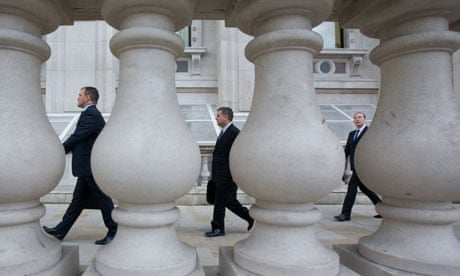One of the government's biggest suppliers has written off a year's worth of contracts with the coalition as "charity work" and is bidding to carry out more contracts for free after ministers clamped down on the multibillion pound Whitehall consultancy industry.
KPMG, ranked the 11th biggest government supplier in the first five months after the election, provides audit, advisory and consultancy services. The firm said it was not expecting to profit from its work with the coalition until the middle of next year, that 10% of its public sector work was done for no charge and that it has bid just £1 for some contracts worth millions.
KPMG's position comes after ministers ordered a freeze on new consultancy contracts this year and set about renegotiating existing contracts to get a discount. It reveals the lengths to which some firms are going to stay onside with the coalition.
Alan Downey, head of public sector at KPMG, said: "Government is turning to firms such as us to help them carry out its major reforms but without a willingness to pay. We can't afford to do it indefinitely, but we can in the short-term. We're hoping to position ourselves well when the government decides it is willing to pay."
He said that the work was being seen as part of the firm's "corporate, social responsibility" agenda, whereby partners at KPMG also do voluntary work with local schools and provide advice on other charitable and public sector projects for free.
"From a commercial perspective we're hoping the central government market will get better in the second half of 2011," said Downey. "It's not a question of thinking the chequebook will come out and we'll go back to the way it was but it will come to a more moderate level. We wouldn't do free work permanently. We couldn't afford to. We have to make an acceptable return."
Last year the government spent nearly £2bn on consultancy services. The National Audit Office said in the autumn that many of the contracts were wasteful and badly controlled.
Evidence presented by the cabinet secretary, Gus O'Donnell, to the public accounts committee showed a 46% reduction in the consultancy bill since the summer but also an expectation of a reverse as coalition reforms were implemented. The committee later said that a lack of skills within the civil service had fuelled the need for consultants, and criticised the government for not improving training to save money.
Downey said. "Government has got over-reliant on consultants and advisers and has broken commonsense rules … The thing that has been genuinely new has been this willingness on the part of suppliers to work for free or virtually free, bidding for work at a pound."
On one recent government contract five contractors all bid to undertake the work for £1, he said. But Downey also acknowledged that there was a degree of self-interest on the part of firms, which are expecting a resurgence of consultancy in government in the near future.
"Firms like ours are always keen to get in on the really big programmes. If you can get in at the part of the programme when you are working out how to do it, the hope is you can stay there," he said.
Francis Maude, the Cabinet Office minister, who has been in charge of the efficiency drive, has signed memorandums with the 19 biggest suppliers to reduce costs and is close to signing up another 34. Ministers from across Whitehall have been assigned firms to negotiate with.
Last week Maude announced that £1bn savings have been achieved, of which half has come from the moratoriums on consulting, ICT, recruitment, marketing and property spending. Last month advertisers complained that they were being asked to work for free on campaigns that would have previously been worth millions.
